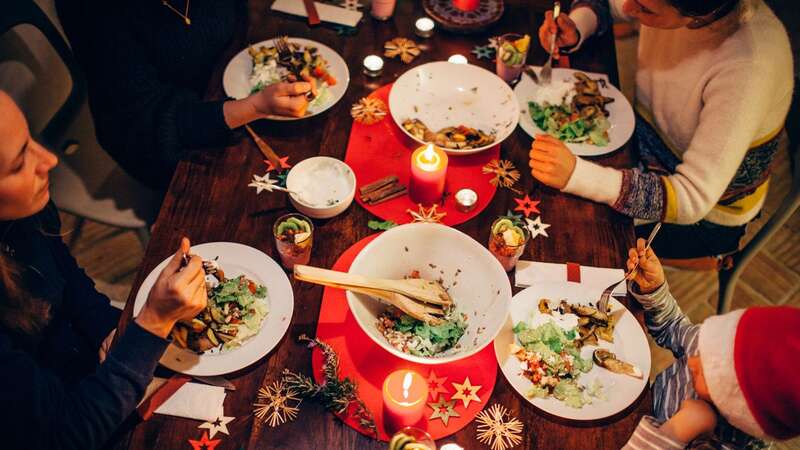It's thought that one in five people in the UK experience irritable bowel syndrome (IBS) which means if you don't experience it, it's probable that you know someone who does.
The condition is common and affects the digestive system. Symptoms include stomach cramps, bloating, diarrhoea and constipation. These symptoms tend to come and go extremely quickly but can last for weeks at a time. The specific cause is unknown but diet changes can help some people massively reduce symptoms.
Christmas tends to be a fraught time for those who experience IBS, with excessive food and plenty of alcohol dominating festivities. The much anticipated Christmas dinner can be extremely difficult to manage for those with the condition, WalesOnline reports.
Dr Claire Merrifield, GP at Selph said: “Fatty foods and alcohol are common triggers of IBS, which can make Christmas a very difficult time for those that suffer with it. In addition, stress tends to make symptoms of IBS worse.
"Most people with IBS also will know that foods that have a high FODMOP (Fermentable Oligosaccharides, Disaccharides, Monosaccharides and Polyols) content can create more gas and bloating. High FODMAP foods like cauliflower, onions and garlic, milk, bread and sweeteners tend to be prominent foods at Christmas time.
 Shoppers are swearing by 'game changing' supplements that massively reduce bloat
Shoppers are swearing by 'game changing' supplements that massively reduce bloat
“Fatty foods like cheese and chocolate which are hard to avoid over the festive period, might increase symptoms of IBS, in particular abdominal pain related to eating. Cruciferous vegetables like Brussels sprouts and cabbage are actually a low FODMAP food, however they often lead to a lot of gas production and some people with IBS will prefer to avoid this."
For those who experience IBS, Dr Merrifield shares her top tips to manage it over the festive season to enable you to continue to enjoy festivities with ease and comfort. Dr Merrifield said: “Love them or hate them, there is actually science behind the reasons why Brussels sprouts make you gassy.
"Although they’re high in vitamins and antioxidants, they contain a lot of fibre which is fermented by bacteria in our colon, leading to the production of gas that our bodies must release. This can lead to discomfort in some people with IBS
“Try swapping out Brussels sprouts for a less gassy alternative, like carrots or green beans. The rest of the dinner table might even be jealous!”
Dr Merrifield's top tips:
Cut back on fat
Dr Merrifield said: “Fat is thought to trigger some symptoms of IBS. There are usually lots of fatty foods on offer for dessert, like cake, cheese and chocolate.
“If you’re in charge of cooking, try and make sure there are some lighter snacking and dessert options. You can also bring some mindfulness to your eating - do you really want that whole chocolate orange right now? Or can you just have a small segment and really enjoy it?"
Limit alcohol and caffeine
Dr Merrifield said: “Alcohol, tea and coffee can all trigger symptoms of IBS, so it’s worth being mindful of what you’re drinking. Most of us have something in our hands that’s not water for most of the Christmas period so think about ways you could reduce the caffeine and alcohol you’re consuming.
"You might want to stock up on non-alcoholic or decaffeinated alternatives. Fruit-infused water is a really nice way to stay hydrated and refreshed and peppermint tea can help with abdominal pain related to IBS."
 'My life was controlled by IBS until I found a miracle treatment aged 66'
'My life was controlled by IBS until I found a miracle treatment aged 66'
Wear loose-fitting clothing
Dr Merrifield said: “Whenever we sit down to eat a big meal, we are likely to feel our bellies getting bigger. Wearing tight-fitting clothes or tightly elasticated waistbands can mean our gut can’t work as effectively and may lead to painful trapped wind. Wear loose-fitting clothes that are baggy around the middle, everyone’s focussed on their food, not your waistline, so prioritise comfort over fashion.”
Minimise stress by taking short breaks and mindful moments
Dr Merrifield said: “Christmas can be a stressful time for many of us. If you’re alone there may be increased feelings of isolation and sadness. If you’re with loved ones a combination of family tensions and loosened inhibitions can lead to difficult atmospheres. Remember it’s OK to take a minute to breathe. There are some really simple breathing techniques you can try, even in the middle of a conversation to help you get a bit of perspective. Try the 3-4-5 method, breathe in for three seconds, hold for a count of four, then breathe out for a count of five. Do it a few times to recenter yourself.
"IBS is thought to be a disorder of gut-brain interaction so take a moment as often as you can to be present to the sights, sounds, smells and feelings around you. The more you can ground yourself in the present moment, the less feelings of anxiety and worry you’ll tend to experience. Try and enjoy the festive season, whatever it brings for you."
Read more similar news:
Comments:
comments powered by Disqus

































